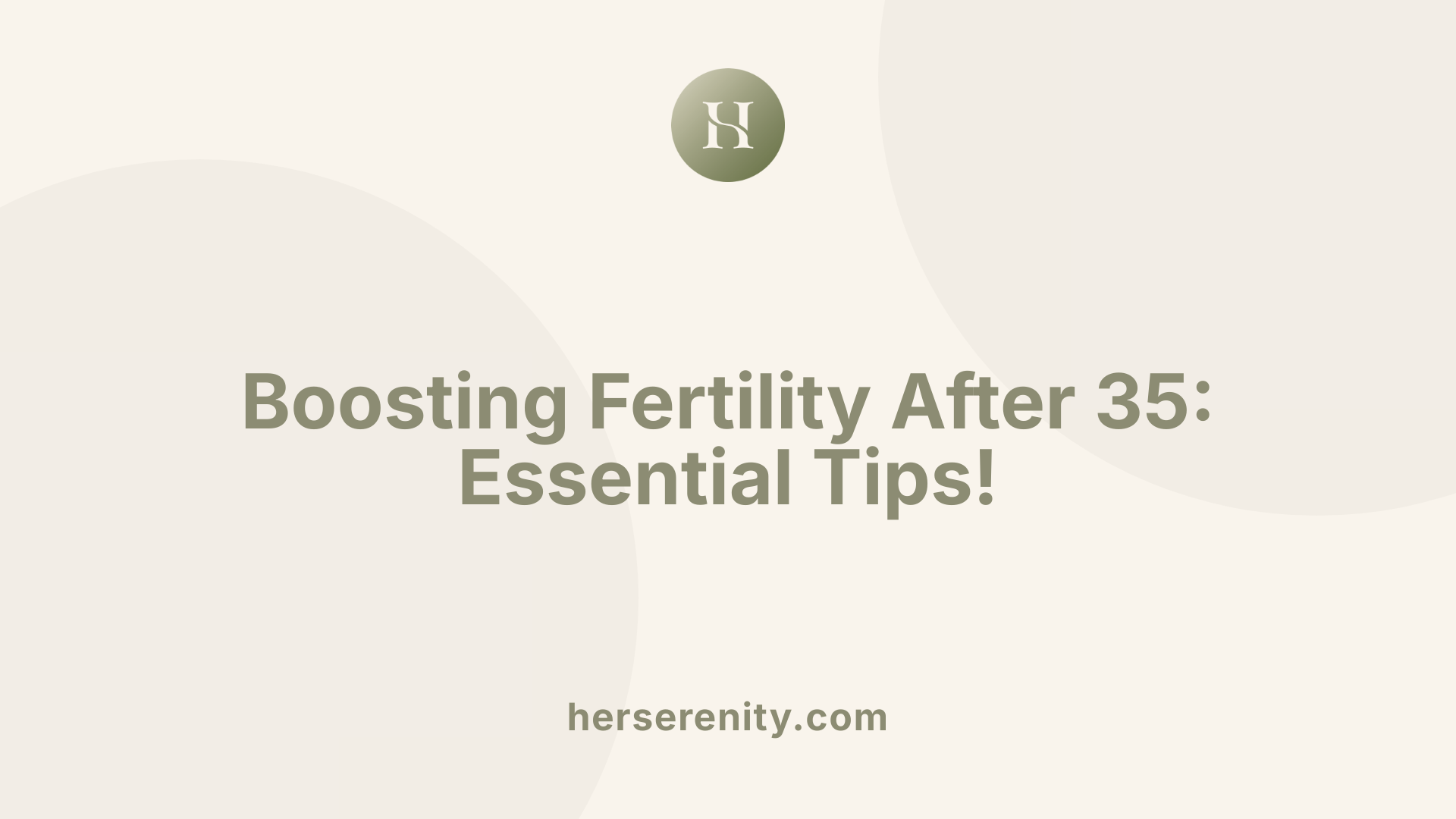How to Improve Fertility with Lifestyle Changes
Practical Lifestyle Adjustments for Enhancing Fertility

Introduction
Fertility is a concern for many individuals and couples, particularly as they embark on plans to conceive. Scientific evidence suggests that lifestyle modifications can significantly impact reproductive health and fertility outcomes. From maintaining a healthy weight to managing stress effectively, there are several actionable steps one can take to improve their chances of conception naturally. This article explores evidence-based lifestyle changes that can enhance fertility and lays out practical strategies for implementing these changes.
General Lifestyle Modifications for Fertility Enhancement

What are general lifestyle changes to improve fertility?
General lifestyle changes to improve fertility are essential for both men and women. Maintaining a healthy weight is crucial, as being either overweight or underweight can negatively impact ovulation and fertility. For women, achieving a normal BMI (18.5 to 24.9) can enhance reproductive health.
A balanced diet plays a vital role. Eating plenty of vegetables, lean proteins, healthy fats, and whole grains can significantly reduce the risk of infertility. It’s important to focus on a diet rich in antioxidants, such as colorful fruits and vegetables, which protect reproductive cells from damage. Moreover, regular moderate exercise is beneficial, contributing to a healthy weight and hormone balance. However, excessive strenuous workouts should be avoided as they can disrupt menstrual cycles.
Quitting smoking and limiting alcohol and caffeine intake are also imperative for enhancing fertility. Smoking decreases egg quality in women and sperm quality in men. Likewise, excessive alcohol consumption can adversely affect reproductive health. It is advised to limit caffeine to under 200 mg per day.
Finally, managing stress through techniques like yoga and meditation can further support reproductive health. Stress management not only alleviates anxiety but also helps optimize hormonal balance, a key contributor to fertility.
Navigating the Impact of Body Weight on Fertility

How does body weight impact fertility and what changes should be made?
Maintaining a healthy body weight is critical for fertility, as extremes in weight significantly hinder reproductive capabilities in both women and men. A normal Body Mass Index (BMI) is essential for optimizing fertility, typically ranging from 19 to 24. Women who are underweight, with a BMI less than 19, may face menstrual irregularities and ovulatory dysfunction, which can impede their ability to conceive. Conversely, overweight individuals (BMI between 25-29) and those who are obese (BMI ≥ 30) are more susceptible to infertility, hormonal imbalances, and complications during pregnancy.
When it comes to male fertility, excess weight can lead to reduced sperm quality and lower counts, directly affecting the chances of conception. Research shows that weight loss between 5-10% can enhance fertility for overweight or obese women, restoring regular menstrual cycles and improving overall fertility outcomes.
Nutrition and exercise for weight management
The pathway to achieving and maintaining a healthy weight lies primarily in balanced nutrition and consistent physical activity. A diet rich in fruits, vegetables, whole grains, and lean proteins is recommended, while it’s advised to limit the intake of processed foods, added sugars, and saturated fats. Regular, moderate exercise is also crucial; it not only helps to manage weight but can positively influence hormonal balance and reproductive health for both sexes. Activities like brisk walking, cycling, and swimming are ideal, with at least 30-60 minutes of moderate exercise recommended several times a week.
Impact on male and female fertility
In conclusion, body weight and fertility are closely linked. Women facing infertility issues due to excess weight can drastically improve their chances of conception through lifestyle adjustments. In men, achieving a healthy weight contributes to better sperm production and quality. Regular check-ups with healthcare providers can help couples navigate these changes effectively, promoting healthier reproductive outcomes as they strive to conceive.
Boosting Fertility After Age 35

How can I optimize my lifestyle to boost fertility after age 35?
To enhance fertility after age 35, it is fundamental to focus on several lifestyle adjustments. Keeping a healthy weight is paramount; maintaining a Body Mass Index (BMI) between 18.5 and 24.9 can support hormonal balance and improve ovulation. Weight extremes can disrupt menstrual cycles, so even a slight weight loss of 5% can be beneficial for reproductive health in women.
A balanced, fertility-friendly diet is also essential. Incorporate plenty of seafood, whole grains, fruits, and vegetables. These foods are rich in antioxidants and nutrients vital for reproductive health. For example, amino acids from plants contribute positively to ovulatory function. Limiting processed sugars and fats while prioritizing high-fiber foods can help manage insulin levels, which play a crucial role in fertility.
Regular physical activity can boost fertility but should be moderated. Aim for 30-60 minutes of moderate exercise most days of the week, such as walking or swimming. Avoid strenuous workouts that may lead to hormonal disturbances.
Tracking ovulation cycles is beneficial for timing intercourse. Consider using ovulation predictor kits to maximize chances of conception. It’s advisable to maintain a moderate caffeine intake, stick to no more than 200 mg per day, and avoid tobacco and limit alcohol consumption, as these can negatively affect fertility.
Lastly, consulting with a healthcare provider after six months of trying to conceive is supportive of a tailored approach to assessing reproductive health. This will ensure that any potential issues are addressed in a timely manner. With these lifestyle modifications, you can significantly enhance your chances of conceiving.
Dietary Choices for Enhancing Female Fertility

What specific foods can increase fertility in females?
To enhance fertility in females, a carefully curated diet plays a critical role. Prioritizing foods rich in antioxidants, particularly leafy greens, berries, tomatoes, sweet potatoes, and beets, protects reproductive health by neutralizing harmful free radicals.
In addition to antioxidant sources, incorporating omega-3 fatty acids is vital. Foods such as fatty fish (like salmon and sardines), walnuts, and flaxseeds are excellent choices that promote hormonal balance and improve egg quality.
Furthermore, full-fat dairy products have been suggested to lower the risk of ovulatory infertility. Sources such as whole milk, yogurt, and cheese can be beneficial, whereas low-fat dairy may contribute to hormonal imbalances that disrupt ovulation.
Lean proteins, particularly plant-based options such as beans and lentils, should also be included as they provide essential nutrients and support implantation. A holistic approach to diet should minimize processed carbohydrates and alcohol, while emphasizing a balance of healthy fats, whole grains, and fruits to create a favorable environment for conception.
Strategies for Natural Ovulation Enhancement

What steps can I take to naturally boost ovulation at home?
To naturally boost ovulation at home, consider implementing these strategies:
Dietary Adjustments
- Focus on Nutrient-Dense Foods: A diet rich in antioxidants, omega-3 fatty acids from sources like fatty fish and flaxseeds, and high-fiber foods can enhance reproductive health.
- Limit Unhealthy Fats: Avoid trans fats and highly refined carbohydrates, which can negatively influence hormonal balance.
- Hearty Breakfast: Starting the day with a substantial breakfast can improve hormonal balance, especially in women with PCOS.
Exercise and Stress Management
- Regular Moderate Exercise: Aim for at least 30 minutes of moderate activity (like walking or swimming) several times a week to maintain a healthy weight, which significantly affects fertility.
- Stress Reduction Techniques: Activities such as yoga, meditation, and mindfulness can help manage stress, which is known to impact menstrual cycles negatively.
Supplementation with Vitamins
- Folic Acid and Multivitamins: Prenatal vitamins containing folic acid and iron are crucial. Folic acid supports egg quality and helps prevent neural tube defects.
- Ensure Adequate Sleep: Prioritizing 7-9 hours of quality sleep can help maintain hormonal balance, essential for regular ovulation.
The Impact of Stress and Environmental Factors on Fertility
Stress Reduction Techniques
Managing stress is critical for maintaining optimal fertility. Research indicates that chronic stress adversely affects hormone levels, which are essential for reproduction. Techniques such as yoga, meditation, and mindfulness can significantly help reduce stress levels. These practices not only promote relaxation but can also lead to improved menstrual cycles in women and better sperm quality in men.
Environmental Toxins
Limiting exposure to environmental toxins is vital for both partners. Chemicals found in plastics and certain household products can negatively impact reproductive health. It is advisable to avoid microwaving food in plastic containers and use unfragranced, natural products whenever possible. Cleaning and personal care products should also be scrutinized for harmful substances.
Lifestyle Factors Affecting Both Partners
Lifestyle choices play a considerable role in fertility for both men and women. Maintaining a healthy weight, quitting smoking, and limiting alcohol consumption are essential. Regular, moderate exercise—such as walking or swimming—can improve reproductive health, while sufficient sleep (7-9 hours per night) supports hormonal balance. Together, these factors help create a conducive environment for conception.
Conclusion
Implementing lifestyle changes can significantly improve fertility outcomes for those seeking to conceive. By focusing on maintaining a healthy weight, adopting a balanced diet, engaging in regular but moderate exercise, and managing stress effectively, individuals can create a supportive environment for reproductive health. Additionally, it's crucial to limit exposure to harmful substances, practice mindful consumption of food and beverages, and maintain open communication with healthcare providers for tailored advice. While these lifestyle changes benefit fertility, they also contribute to overall well-being, setting a positive foundation for future parenthood.
References
- Lifestyle Changes to Improve Fertility | Ohio Reproductive Medicine
- Lifestyle Changes To Optimise Your Fertility - The Fertility Academy
- 16 Natural Ways to Boost Fertility - Healthline
- Optimizing fertility Part 1: Evidence-based lifestyle changes
- Lifestyle changes that can help improve fertility
- 8 Lifestyle Changes That Can Enhance Your Fertility
- Lifestyle Interventions for Adults with Infertility - PMC
- Conception Tips | Fertility Network
- 5 preparations before pregnancy - Mayo Clinic Health System































































































